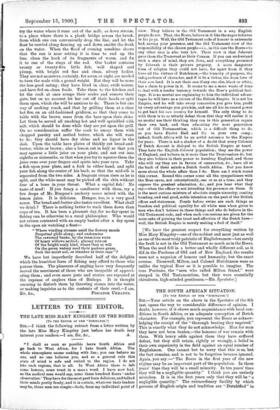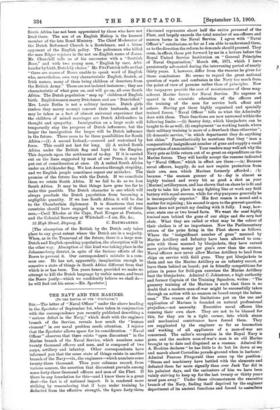THE SOUTH AFRICAN SITUATION.
[To THE EDITOR OP THE " SPECTATOR."] SIR,—Your article on the above in the Spectator of the 8th inst. opens the way to considerable difference of opinion. I doubt, however, if it shows much acquaintance with local con- ditions in South Africa, or an adequate conception of Dutch character. For example, you represent the Boers as acknow- ledging the receipt of the " thorough beating they required." This is exsatly what they do not acknowledge. Man for man they have not been beaten,—the honours of war remain with them. With heavy odds against them they have suffered defeat, but they still retain, rightly or wrongly, a belief in their own superiority in the field against an equal number of Englishmen. One cannot but be sorry that this is so, but the fact remains, and is not to be forgotten because ignored. Again, you say :—" The Boers in the first year of the new regime may be an important part of the population. In three years' time they will be a small minority. In ten years' time they will be a negligible quantity." I think you are entirely mistaken. It is in the first years only that they will be " a negligible quantity." The extraordinary facility by which persons of -English origin and tradition are " Dab:Allied" in
South Africa has not been appreciated by those who have not lived there. The son of an English Bishop is the keenest member of the late Bond Ministry. The Chief Moderator of the Dutch Reformed Church is a Scotchman, and a bitter opponent of the English policy. The policeman who killed the man Edgar rejoices in the not un-English name of Jones. Mr. Churchill tells us of his encounter with a " Scottish Boer," and with two young men, " English by race, Afri- kander by birth, Dutch by choice." Mr. FitzPatrick tells us that " there are scores of Boers unable to speak word of English who, nevertheless, own very characteristic English, Scotch, or Irish names, many of them being children of deserters from the British Army." These are not isolated instances ; they are characteristic of what goes on, and will go on, all over South Africa. The Dutch population " mop up " children of English birth. Englishwomen marry Dutchmen and are " Dutchified." Mrs. Louis Botha is not a solitary instance. Dutch girls (unless they marry money) convert their husbands, and it may be taken as a fact of almost universal experience that the children of mixed marriages are Dutch Afrikanders in thought and sympathy. Immigration on a large scale will temporarily stay the progress of Dutch influences, but the larger the immigration the larger will be Dutch influence in the future. There seem to be three possibilities for South Africa:—(1) A second Ireland,—coerced and restrained by force. This could not last for long. (2) A united South Africa under the British flag and loyal to the Empire. This depends upon the settlement of to-day. If it is carried out on the lines suggested by most of our Press, it may be put out of consideration at once. (3) A united South Africa under an Afrikander flag. We lost America through stupidity, and we English people sometimes repeat our mistakes. The promise of the future lies with the Dutch. If we conciliate them we retain South Africa. If we fail to do so we lose South Africa. It may be that things have gone too far to make this possible. The Dutch character is one which will always preclude the Dutch population from becoming a negligible quantity. If we lose South Africa it will be due to the Chamberlain diplomacy. It is disastrous that two countries should have engaged in war on account of three men,—Cecil Rhodes at the Cape, Paul Kruger at Pretoria, and the Colonial Secretary at Whitehall.—I am, Sir, &c., [The absorption of the British by the Dutch only takes place to any great extent where the Dutch are in a majority. When, as in the Transvaal of the future, there is a large non- Dutch and English-speaking population, the absorption will be the other way. Absorption of this kind was taking place in the Johannesburg district, in spite of the furious efforts of the Boers to prevent it. Our correspondent's mistake is a com- mon one. He has not, apparently, imagination enough to conceive a state of things in South Africa different from that which is or has been. Ten years hence, provided we make no attempt to kill the Dutch language by unfair means, and treat the Boers justly—which we confidently believe we shall do— he will find out his error.—En. Spectator.]







































 Previous page
Previous page